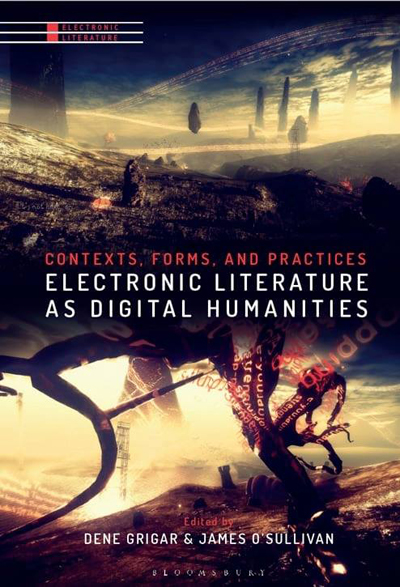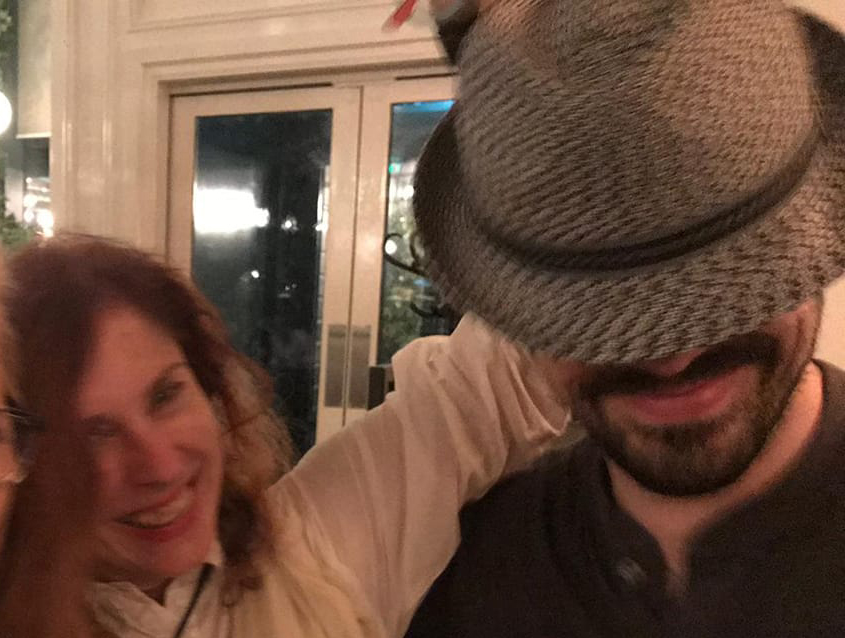The Electronic Literature Lab is happy to announce the forthcoming book in the Electronic Literature Series published by Bloomsbury Press, co-edited by Dene Grigar, ELL Director, and James O’Sullivan, University Cork College.
Electronic Literature as Digital Humanities:
Contexts, Forms & Practices
 Coming January 21, 2021 from Bloomsbury Press!
Coming January 21, 2021 from Bloomsbury Press!
ISBN-13: 978-1501363504
Electronic Literature as Digital Humanities, co-edited by James O’Sullivan and Dene Grigar and published as part of Bloomsbury Press’ “Electronic Literature” series, is a collection of 32 essays by international scholars and artists that argues electronic literature is central to the humanities, particularly one focusing on questions relating to digital culture and “the symbolic representation of language, the graphical expression of concepts, and questions of style and identity” (Burdick et al 12)––and, in fact, is the logical object of study for digital humanities scholars who have, by the second decade of the 21stcentury, cut their teeth on video games, interactive media, mobile technology, and social media networks; are shaped by politics of identity and culture; and able to recognize the value of storytelling and poetics in any medium.
Table of Contents
Introduction
by Dene Grigar
Section I. Contexts
The Origins of Electronic Literature: An Overview
by Giovanna di Rosario, Kerri Grimaldi, & Nohelia Meza
Third Generation Electronic Literature
by Leonardo Flores
Toys and Toons: From Hispanic Literary Traditions to a Global E-Lit Landscape
by Élika Ortega & Alexandra Saum-Pascual
Community, Institution, Database: Tracing the Development of an International Field through ELO, ELMCIP, and CELL
by Davin Heckman
The E-Poetry Festivals: Celebration, Art, & Imagination in Community
by Loss Pequeño Glazier
Cyberfeminist Literary Space: Performing the Electronic Manifesto
by Carolyn Guertin
Bodies of E-lit
by Astrid Ensslin et al.
Section II. Forms
Ambient Art and Electronic Literature
by Jim Bizzocchi
Electronic Literature and Sound
by John F. Barber
Augmented Reality
by Anne Karhio
Artistic and Literary Bots
by Leonardo Flores
Consuming the Database: The Reading Glove as a Case Study of Combinatorial Narrative
by Theresa Jean and Karen Tanenbaum
Hypertext Fiction Ever After
by Stuart Moulthrop
Place Taking Place: Temporary Poetic Theaters
by Judd Morrissey
Kinetic Poetry
by Álvaro Seiça
Kinepoeia in Animated Poetry
by Dene Grigar
Mobile Electronic Literature
by Jeneen Naji
The Voice of the Polyrhetor: Physical Computing and the (e-)Literature of Things
by Helen J. Burgess
Having Your Story and Eating It Too: Affect and Narrative in Recombinant Fiction
by Will Luers
Section III. Practices
Challenges to Archiving and Documenting Born Digital Literature: What Scholars, Archivists, and Librarians Need to Know
by Dene Grigar
Holesas a Collaborative Project
by Graham Allen
Publishing Electronic Literature
by James O’Sullivan
ELit After Flash: The Rise (and Fall) of a “Universal” Language
by Anastasia Salter & John Murray
Learning as you go: Inventing Pedagogies for Electronic Literature
by Davin Heckman
Section IV. Artist Interventions
My cODEwORk ARTicle
by Michael J. Maguire
Locative Narrative
by Jeremy Hight
Come Play Netprov! Recipes for an Evolving Practice
by Rob Wittig & Mark Marino
A Collective Imaginary: A Published Conversation
by Kate Armstrong & Kate Pullinger
Addressing Torture in Iraq through Critical Digital Media Art—Hearts and Minds: The Interrogations Project
by Roderick Coover et al.
Poetic Playlands: Poetry, Interface, and Video Game Engines
by Jason Nelson
A Way Is Open: Allusion, Authoring System, Identity, and Audience in Early Text Based Electronic Literature
by Judy Malloy
 About the Co-Editors
About the Co-Editors
Dene Grigar is Professor and Director of The Creative Media & Digital Culture Program at Washington State University Vancouver whose research focuses on the creation, curation, preservation, and criticism of Electronic Literature, specifically building multimedial environments and experiences for live performance, installations, and curated spaces; desktop computers; and mobile media devices. She has produced 16 media works such as “Curlew” (2014), “A Villager’s Tale” (2011), the “24-Hour Micro E-Lit Project” (2009), “When Ghosts Will Die” (2008), and “Fallow Field: A Story in Two Parts” (2005), as well as 57 scholarly articles and five books. She also curates exhibits of electronic literature and media art, mounting shows at the British Computer Society and the Library of Congress and for the Symposium on Electronic Art (ISEA) and the Modern Language Association (MLA), among other venues. With Stuart Moulthrop (U of Wisconsin Milwaukee) she developed the methodology for documenting born digital media, a project that culminated in an open-source, multimedia book, entitled Pathfinders(2015), and book of media art criticism, entitled Traversals(2017 The MIT Press). She served as President of the Electronic Literature Organization from 2013-2019 and Associate Editor of Leonardo Reviewssince 2003. In 2017 She was awarded the Lewis E. and Stella G. Buchanan Distinguished Professorship by her university. She also directs Electronic Literature Lab at WSUV.
James O’Sullivan (@jamescosullivan) lectures at University College Cork (National University of Ireland). He has previously held faculty positions at the University of Sheffield and Pennsylvania State University. His work has been published in a variety of interdisciplinary journals, including Digital Scholarship in the Humanities, Digital Humanities Quarterly, and the Electronic Book Review. He is the author of Towards a Digital Poetics: Electronic Literature & Literary Games (Palgrave Macmillan 2019). Further information on James and his work can be found at jamesosullivan.org.

